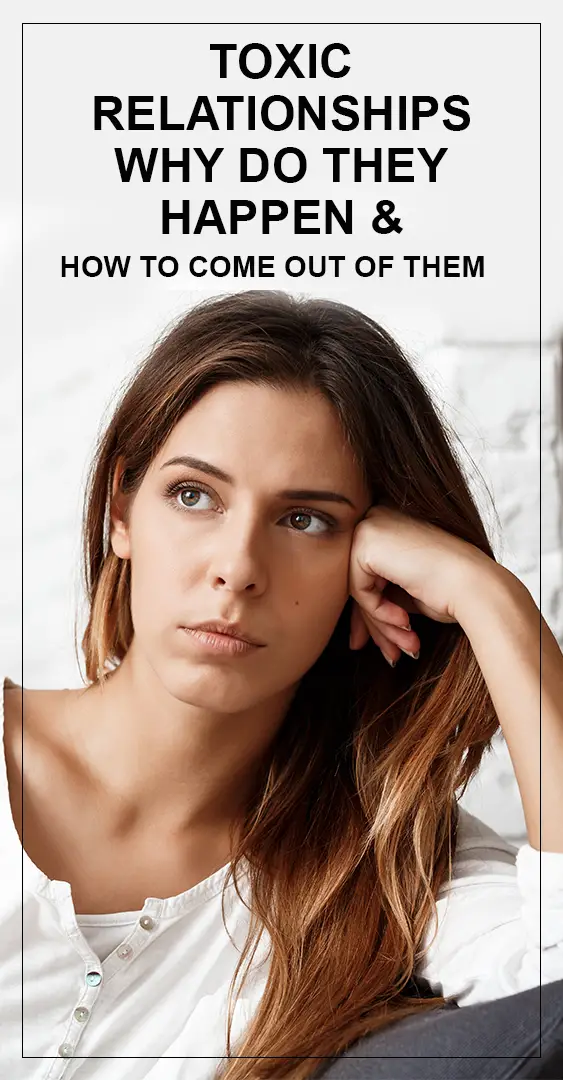
Important: This article is for informational purposes only. Please read our full disclaimer for more details.
When you fall in love, you dream of a beautiful life. But not always do dreams come true as they can turn to be your nightmares.
Certain difficulties like financial problems, parenting, or health issues can be faced together if the relationship with your partner is strong; but if the relationship itself is a problem, how do you recognize and address that?
That’s what happens in a toxic relationship. This post tells you about a toxic relationship, its signs, and ways to come out of it.
What Is A Toxic Relationship?
A toxic relationship is one that is not favorable to you or your partner. It makes you feel suffocated, helpless and drained out. When a relationship turns out to be unhealthy and in-conducive for healthy living, you need to understand that toxicity has seeped into it.
Toxicity need not be experienced right from the beginning of the relationship. In fact, your relationship might begin with all the right feelings from either side. But those feelings might wade and turn toxic eventually.
When you are well into your relationship, you know you need to walk half way through while your partner covers the other half. However, you should not compromise on being treated with respect, being able to share your needs with you partner. So, how do you know that compromise is turning into toxicity?
Signs Of A Toxic Relationship
The signs of toxicity may be subtle for you to identify. Therefore, you may look out for these:
1. Jealousy:
It can mar your otherwise happy marriage. If you are unhappy with your partner moving closely with their friends, or your partner is jealous of your career growth, it sows the seeds of bitterness.
2. Misunderstandings:
You refuse to understand your partner or they do not make an effort to understand you. They don’t call you from office because they might be busy but you misunderstand that they are ignoring you. You talk to your friend over the phone and your partner misunderstands that you are cheating on them. It means there is a lack of trust between you.
3. Passive-aggressiveness:
People with passive-aggressive behavior avoid direct conflict but express their anger indirectly through sulking, procrastination, withdrawal, and stubbornness. This behavior pattern gradually destroys the relationship.
4. Resentment:
All of us have imperfections. But when you start disliking your partner for their every minor shortcoming, they will eventually resent you because nothing they do can please you anymore.
5. Arguments:
Arguments are healthy but beyond a certain limit, they are not. If they become frequent and you refuse to agree on even minor issues, then it is a sign of your weakening bond.
6. Sacrificing your happiness for your partner’s:
You only want to see your partner happy; you go to great lengths to make him/her happy while ignoring your happiness. This can burn you out eventually. Your partner will continue to have high expectations on you, and you may find it hard to meet them.
7. Intolerance:
You cannot tolerate if your partner is unwell and sleeping, or they cannot tolerate if you are watching TV. Such intolerances are the first steps towards toxic relationships.
8. You are not yourself:
Change is good if it’s for the better. But if you’re losing your identity in this process or not being your usual self with your partner, then both of you should talk it out as to where you are heading in your relationship.
A toxic relationship can be the result of certain negative characteristics in you or your partner.
Traits/ Habits That Could Lead To Toxic Relationships
Toxicity can happen at any stage in a relationship. But if your partner or you have any of these traits, then your relationship is likely to face hardships much earlier.
1. Control freak: This person wants to control every aspect of your life, be it the clothes you wear, the people you meet, and even the food you eat. They try to isolate you from your family and friends, thus breaking your support system.
2. Excessively possessive: Being a little possessive about your partner is sweet, and you may find it adorable too. But when your partner’s possessiveness turns into a mad rage, it becomes impossible for you to find your space.
3. Compulsive liar: Sometimes, not telling the truth helps maintain a relationship. But it doesn’t mean you lie at the drop of a hat. When lying becomes compulsive it leads to toxicity.
4. Over-dependent: If your partner is too clingy, is heavily dependent on you for emotional and financial support and refuses to give you any personal space making you feel suffocated, then you are with an over-dependent person.
5. Manipulator: From trivial to important stuff, everything is carried out according to their wishes. In fact, they manipulate you to do everything their way irrespective of your needs, wants, and desires.
6. Perfectionist: The person has expectations as high as the sky, which you would never be able to meet. Living with a partner who constantly nitpicks on you or nudges you to be perfect is difficult and discouraging.
7. Insecure: They are always jealous and suspicious. They will check your phone and emails in your absence and even spy on you. They can make baseless assumptions, and accuse you.
8. Alcoholic: Your partner is so drunk all the time that you hardly see him normal. The relationship turns toxic in no time, and you might want to reconsider your decisions.
9. Abuser: Abusers and mentally sick people are hard to change. You should never allow anyone to abuse you physically or mentally.
10. Cheater: You might want to pardon your partner once. But if cheating becomes a habit for them, then you cannot trust them anymore. It shows that your partner lacks respect for you. It is time you step out of it.
A toxic relationship could be as bad as toxic air and makes you feel suffocated. Coming out of it can be challenging. Seek the help of a mental health professional as toxic relationships can be abusive.
How To Get Out Of A Toxic Relationship?
When you are losing your self-respect, dignity, and peace of mind, then it is time to call it quits. Here are some ways to end a toxic relationship:
1. Accept the reality:
It will allow you to analyze your feelings and have clarity. It’s not easy to walk out of a relationship, but you need to accept that it’s going to be painful. You will be worried about a lot of things like your future, companionship and singleton life. It’s going to be hard initially, but once you cross that stage, you will be relieved. Remember, nothing lasts forever.
2. Let go of your feelings for your partner:
Letting go someone you love and care can be hard. You need to realize that if you are not getting anything in your relationship or if you are the only one who’s working to fix things, then the relationship will never work. You just need to let go and open yourself to the possibilities the future holds. Good things are always in store.
3. Don’t wait for your partner to transform:
If you decide to stay until your partner changes, you would perhaps wait indefinitely. And that makes your partner complacent. Unless your partner realizes their mistakes and is motivated to change, there may not be any hope in the relationship.
4. Stop underrating yourself:
Sometimes you get so entangled in the toxic relationship that you blame yourself for the situation. You might end up feeling low and undeserving of a better person. Realize your value and the fact that you need to be loved and treated well in a relationship.
5. Take charge of your life:
Only you can control your life, don’t leave the reins in the hands of someone else. If you feel it’s overwhelming to go through it alone, take help from family and friends or professional counselor if required.
6. Take a break:
Time is the best healer. When you take a break from your relationship, you give yourself some time to heal by resting your mind and body. You get a chance to introspect and know yourself. Take time to pursue your interests and hobbies. Do the things you used to love and begin enjoying your life.
7. Tell them what you feel:
Before you walk out of the relationship, let your partner know the reasons behind your decision. Tell them what you have gone through and how you feel. If the other person isn’t sensitive enough to understand your plight, then you may have to be assertive and let them know that you are not going to tolerate their behavior anymore.
When you experience toxicity in a relationship, you most likely deny or justify the behavior of your partner. But certain things, such as abuse, cheating, humiliation, and lying, should never be ignored in a relationship.
So, how can you be sure you are not in a toxic relationship? The following quiz can perhaps help you understand.
Toxic Relationship Quiz
- How do you know if you are in a toxic relationship or if it’s a temporary glitch? Ask the below questions to yourself.
- Are you being criticized, humiliated, and ignored?
- Do you feel terrible about yourself?
- Are you not doing things that you enjoyed doing because your partner doesn’t want you to?
- Are you forced to do things you don’t like?
- Have you no control over your life and your partner takes all the decisions on your behalf?
- Are you the only one giving in the relationship without getting anything in return? Are you emotionally or physically abused?
- Do you fear your partner?
- Are you physically and mentally drained?
- Are you cut off from your family and friends because of your partner?
If you have answered ‘yes’ to most of the questions, then you are certainly in a ‘toxic relationship’, and it’s time to detoxify your life.
You are the best judge of your life. You know what is good for you and what makes you happy. Assess your situation, and take a decision that can be the best for you.
You Might Also Like:
- What Is Considered Cheating In A Relationship? 6 Main Types
- 9 Signs Of Being Insecure In Relationship
- 5 Reasons Why Fighting Is Good For Your Relationship
- 15 Subtle Signs Of Manipulation In A Relationship
- Verbal Abuse In A Relationship: Definition, Signs And Types
Image Credit: freepik
















